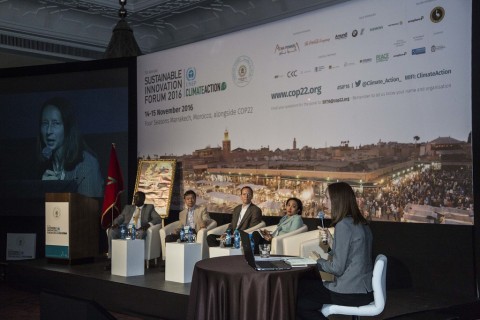The Conference of the Parties (COP 22) was held in Marrakech, Morocco from November 7-18. The largest side event, the Sustainable Innovations Forum (SIF), offered an opportunity for business, NGOs, and government actors to come together to share and discuss our environmental future. Despite the unexpected disruption of election results from the U.S. and the possible threat of a U.S. withdrawal from the Paris Agreement, the government negotiations and civilian discourse retained a level of resolve. Lord Nicholas Stern, an economist and professor at the London School of Economics, explained that this momentum is “the story of the future” and these delegates understand the grave reality and the need for alternative futures. Erik Solheim, Executive Director of UN Environment (UNEP) and Under-Secretary-General of the UN, also echoed this attraction to imagining new possibilities. He explained that climate issues are not a burden, but rather an opportunity for a multitude of stakeholders including capitalists. Solheim also reiterated a common feeling among participants, which is if the U.S. does not choose to be a leader in the fight for 2-degrees, the cap for global temperature increases set by the Paris Agreement, other international advocates will rise to the occasion.
Capitalists are an irreplaceable, central subset of players in the fight to stabilize the environment and Solheim argued that big business could have a larger impact than many governments. Paul Simpson from the Carbon Disclosure Project also highlighted the fact that large corporations are more powerful than their nation-state counterparts. The forum did not make any truly radical critique of the role of industrialization in creating much of the environmental issues we face today, it strongly emphasized the necessity of a shift in businesses’ conduct. Stern also expressed concern for the future of burgeoning mass urbanization in the next 20 years. He asserted that if infrastructure is doubled in the next 20 years without a strict focus on environmental issues like pollution and congestion, the goals of the Paris Agreement would undoubtedly fail. Andrew Deutz, the Director of International Government Relations at the Nature Conservancy, declared that the effects of rapid urbanization can be mediated through upfront, large-scale spatial planning and energy development. He emphasized “doing it right” from the beginning.
Paul Isaac Musasizi is the CEO of Kiira Motors, the company that developed Africa’s first solar powered bus. He emphasized the need for green, noise-free public transport in Africa’s urbanizing cities. He has introduced a fleet of 14 passenger vans in Kampala, Uganda with unequivocal success. Musasizi explains that consumerism is not able to drive the radical change needed in the public transport industry and the economy. We need grassroots action to catalyze the mainstream agenda and form a “critical mass of support to transform,” he elucidated. His solar powered buses offer a clean solution to the issues of mass affordable mobility in low-income African cities. He centers the concerns of indigenous people in their business model to increase impact. Kiira Motors has been financially successful as well as socially impactful, and Eric Olson, senior vice president at the nonprofit BSR, described the need to “take care of people” as businesses turn towards green energy and making green profits. Elham Ibrahim, the World Energy Council and Commissioner of Infrastructure and Energy, clarified that lowering carbon emissions is an opportunity for Africa but requires a negotiation between security, affordability, and environmental sensitivity. Dr. Suzanty Sitorus of Climate Policy Initiative implored the audience to push businesses to lead by example and “show what is possible.”
Lord Stern depicted how cities from Barcelona to Bogota and companies from Unilever to Ikea have set a precedent for cleaner supply chains and greener economies. April Crow, the director of Environment and Sustainability for Coca-Cola (the corporate sponsor of SIF), emphasized the “local nature” of the company. She said that franchising allows Coca-Cola products to be localized, to use local employees, and to limit shipping and contribute to the circular economy. Only a lone high school student from the Green School, an environmental school in Indonesia and the only young participants at the $1000-a-ticket forum, questioned Coke’s commitment to measures against climate change. She challenged capitalists’ commitment to anything other than profit, and another student questioned their excessive water usage and the plethora of single-use plastic bottles that littered the tables at the event.
Lord Stern had explained the recent populist movements across the Western world as a deep reaction to 30 years of “precarious living conditions” and economic inequality and while many speakers offered interesting sustainable alternatives, the question remained of how corporations, which exacerbate economic inequality, can ever possibly drive equitable environmental progress. Stern’s emphasis on crafting a story of equitable environmentalism that opposes the “attractive” narrative of extreme populist movements did not seem to align with many of the corporate speakers that spoke of “monetizing” the environmental movement. However, though, COP22 did show the necessity of large business compliance and action in the face of climate change and reaching the 2-degree goal of the Paris Agreement. While the discussions at the forum did not seem radical enough to adequately espouse inclusive environmental justice, the panels did offer a palatable, unifying commentary in the face of divisive right-wing populist movements that deny climate change.

